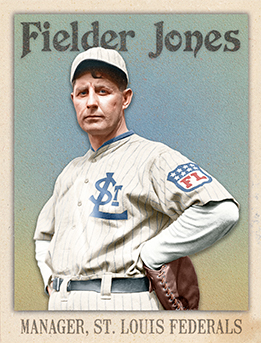
- Series: Diamond Heads '15
- City: St. Louis
- Team: Terriers
- League: Federal League
Fielder Allison Jones (1871-1934) made his name in baseball's history books by eking just enough results from minimal production to win the White Sox their first Series title in 1906. That club has forever been known as the “Hitless Wonders,” a squad of light-hitting scrappers who, under Jones' able direction, were able to best the powerful Cubs. The '06 Series was noteworthy as the first cross-town matchup and the only one to pair the Chicago franchises. It was also one of the greatest upsets, with the Cubs' bats held in check by Ed Walsh and other Sox hurlers. In taking the final two contests, Jones' crew stepped out of character and rapped 26 hits. Overall, though, his boys lived up to their “hitless” reputation, managing only a .198 average for the series. Jones was one of the most adept managers of his era in teaching “inside baseball” or “small-ball” whereby his charges frequently plated runs without the benefit of hits in the inning. Jones was a blue-blood, tracing his heritage to Scotland's Robert Bruce on one side and a Mayflower landing on the other. He had university training that perhaps predicted the cerebral approach Fielder always brought to the game. He had come out of rural Pennsylvania to play for Brooklyn where he helped the team to pennants in 1899 and 1900. Moving to Chicago only continued his winning ways, gaining another gonfalon in 1901, the new American League entry's first. As a player, Fielder had made a fine record, leading the Superbas in 1900 and hitting .285 overall.
- Jones moved from Chicago to St Louis when the Federal League and the Terriers beckoned him back to the majors in 1914 and he remained with the Browns through the 1918 season
- Though the White Sox were a poor hitting team in '06, they had come a long way under Jones' leadership. A writer of the day lauded him as having introduced “speed, psychology and daring into the game.”
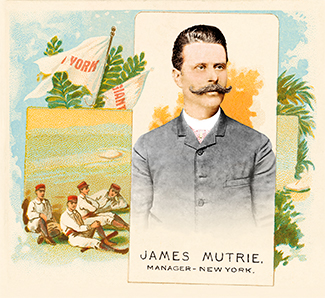
- Series: 1888 Champion New York Giants
- City: New York
- Team: Giants
- League: National League
James J. Mutrie (1851-1938) was a giant among early baseball entrepreneurs. He may rightly be known as the father of New York baseball, is second only to Joe McCarthy in manager winning %, won pennants in two leagues, helped create (and won) the first true inter-league run-up to the “world series” and popularized the nickname for his Manhattan “Gothams” by referring to his burly lads as “my Giants!” Along the way, “Truthful James” (a wry sobriquet given by the immortal Father Henry Chadwick) stirred controversy at nearly every turn, risked all and in the end, lost. Yet he was beloved by his players and for decades was revered in the Big Apple as the man who truly brought the game to its biggest stage. He and partner John Day audaciously brought two new NY entries into the city: the AA’s Metropolitans and what would become the National League’s Polo Grounds-dwelling Giants who triumphed in the first two post-season tournaments. Done in by the Players’ League rebellion and ensuing financial pressures, Mutrie was forced from the game in 1892.
- Mutrie prospered by raiding AA players for his NY club and paid the price when his top talent defected a decade later to the PL
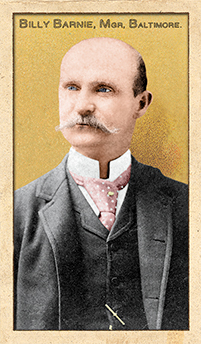
- Series: Beginnings: 1880's
- City: Baltimore
- Team: Orioles
- League: American Association
William Harrison Barnie (1853-1900) played catcher/OF for three National Association teams in the 1870s prior to beginning an extensive career as manager. Nicknamed “Bald Billy,” Barnie struck a distinguished pose for the Old Judge photographer during his days with the Orioles, the club he led for nine years. Billy left Baltimore following the 1891 season for a very brief turn with the Senators before managing Louisville and Brooklyn for two years each. Barnie’s frail health felled him a mere two years after his final campaign with the Bridegrooms, dying of pneumonia at age 47.
- While Mike Scanlon was desperately trying to gain major-league status for his Washington Statesmen in 1885, he publicly engaged Barnie in war of words seeking a contest with the Orioles to prove his team’s mettle. When the match finally occurred, following a wearisome Baltimore road trip, the D.C. lads prevailed 3-2 on May 28. The following year, Scanlon brought his squad into the NL
- Barnie was a lifelong partisan of the American Association, working hard to reconstitute it. He was mourned as a beloved man who would have had a big impact as the AL was forming
Auction History
Cartophilia
Old Judge Pose: 21-1
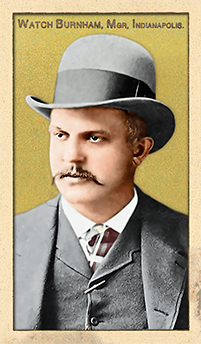
- Series: Beginnings: 1880's
- City: Indianapolis
- Team: Hoosiers (NL)
- League: National League
George Walter Burnham (1860-1902) was lured from the ranks of National League umpires to become the first manager of the new Indianapolis Hoosiers franchise when John Brush brought the beleaguered St Louis Maroons to a joyous community. “Watch” thus became a key figure in the sad saga of major league baseball in Indiana. The club lost every one of its arduous 22-game road trip and floundered all of the 1887 inaugural year. Burnham thought fining all the players might improve morale but captain Jack Glasscock mutinied. The Chicago Tribune reported the fear that “someday the men will decline to go on the field.” Days later Brush replaced Watch with another manager with no playing or managing experience and would try yet another neophyte, a sportswriter, before that dismal season mercifully ended with a 37-89 record. Burnham’s reputation preceded him to the Hoosiers and gave pause. The nickname was said to have derived from George’s failed attempt at self-promotion by presenting himself with an engraved watch during a Cleveland game in ‘83 that he was umpiring.
- Watch’s total experience officiating was 107 games scattered over five seasons between ‘83 and ‘95. He called Old Hoss Radbourn’s no-hitter on July 25, 1883
- The Hoosiers’ prospect finally seemed ready to improve in 1889 with the arrival of Amos Rusie. Sadly for the city, Brush parlayed his investment into a lucrative career with the Reds and Giants by dumping the woebegone Hoosiers after their third losing season
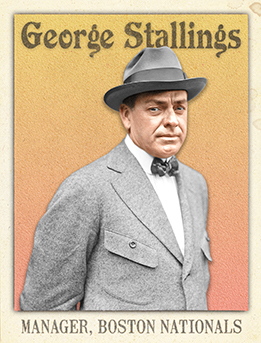
- Series: Diamond Heads '15
- City: Boston
- Team: Braves
- League: National League
George Tweedy Stallings (1867-1929) got two hits in his 20 major league at bats. He managed the Phillies to 74 wins and 104 defeats in his first two years as pilot of a big league team. He did a bit better with Detroit and NY when he joined the American League but would end his career as field general with a mediocre sub-.500 record. So why is this fellow known as the “Miracle Man?” He left the Highlanders for Boston in 1913 and brought signs of life to Beantown’s beleaguered Braves. They rose to a fifth place finish after bottoming out each of the previous four years. But, oh what joy 1914 would bring. That season started as dismally as usual for a Stallings-led squad. On July 15 the Braves trailed the Giants by 11 ½. Suddenly the stars aligned. Boston would end that regular season by gaining 22 games on NY. They rode their 10 ½ game lead into the Series with the Athletics and swept them in four. The team would forevermore be the “Miracle Braves” and George earned the nickname he carried the rest of his life.
- Bill James credits Stallings with being the first to deploy platooning as an offensive tool rather than a cover for weakness
- The Georgia native went on to reestablish baseball in Montreal and, with his partners, built the stadium where Jackie Robinson prepped for his historic debut in Brooklyn in ‘47




